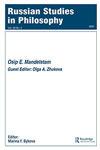Some Features of Russian Reception of Martin Heidegger in Relation to Debates Over His Black Notebooks
IF 0.1
4区 哲学
Q4 Arts and Humanities
引用次数: 0
Abstract
ABSTRACT This article focuses on the Russian image of Heidegger as a thinker of Being, as a conservative critic of late modernity, and as a “post” philosopher. On the one hand, special interest in Heidegger’s theory of deconstruction developed in Russia under French postmodernism’s influence on late Soviet and post-Soviet philosophy. On the other hand, reception of Heidegger’s critique of European nihilism, total domination, and scientific technology contributed significantly to interest in issues related to the political implications of philosophy. The author sees the unique features of Heidegger’s Russian reception in its rejection of the rigid distinction between Heidegger’s “core” philosophy and the “incidental” circumstances associated with his political activities in the 1930s. The current debates over his Black Notebooks demonstrate not only the existence of an independent language of description and analysis in Russia’s philosophical milieu, but also an original tendency toward a holistic consideration of Heidegger’s thought. In addition to reviews of his Black Notebooks by Nelly V. Motroshilova, Vladimir V. Mironov, and Dagmar Mironowa in the pages of Voprosy filosofii, the author discusses the earlier works of Nelly V. Motroshilova, Vladimir V. Bibikhin, Arseny V. Gulyga, Valery A. Podoroga, and Aleksandr G. Dugin.从海德格尔黑色笔记之争看其接受俄罗斯的一些特点
摘要本文着重探讨了海德格尔作为存在论思想家、晚期现代性保守主义批评家和“后”哲学家的俄罗斯形象。一方面,在法国后现代主义对后苏联和后苏联哲学的影响下,俄罗斯对海德格尔的解构理论产生了浓厚的兴趣。另一方面,接受海德格尔对欧洲虚无主义、全面统治和科学技术的批判,极大地促进了人们对哲学政治含义相关问题的兴趣。作者认为,海德格尔接受俄罗斯的独特之处在于,它拒绝将海德格尔的“核心”哲学与他在20世纪30年代的政治活动中的“偶然”环境严格区分开来。当前关于他的《黑色笔记》的争论不仅表明了在俄罗斯哲学环境中存在着一种独立的描述和分析语言,而且还表明了对海德格尔思想进行整体思考的原始倾向。除了在Voprosy filosofii的页面上对Nelly V.Motroshilova、Vladimir V.Mironov和Dagmar Mironowa的《黑色笔记》的评论外,作者还讨论了Nelly V.Motroshilova、Vladim V.Bibikhin、Arseny V.Gulyga、Valery A.Podoroga和Aleksandr G.Dugin的早期作品。
本文章由计算机程序翻译,如有差异,请以英文原文为准。
求助全文
约1分钟内获得全文
求助全文
来源期刊

RUSSIAN STUDIES IN PHILOSOPHY
PHILOSOPHY-
CiteScore
0.10
自引率
0.00%
发文量
14
期刊介绍:
Russian Studies in Philosophy publishes thematic issues featuring selected scholarly papers from conferences and joint research projects as well as from the leading Russian-language journals in philosophy. Thematic coverage ranges over significant theoretical topics as well as topics in the history of philosophy, both European and Russian, including issues focused on institutions, schools, and figures such as Bakhtin, Fedorov, Leontev, Losev, Rozanov, Solovev, and Zinovev.
 求助内容:
求助内容: 应助结果提醒方式:
应助结果提醒方式:


